If you’ve ever wondered how the hospitality industry keeps pests at bay, you’ve come to the right place. In this article, we’ll explore the fascinating world of pest control in hotels, resorts, and other hospitality establishments. From preventive measures to effective solutions, we’ll uncover the secrets behind maintaining a pest-free environment in this thriving industry. So, grab a cup of coffee and get ready to discover the tricks of the trade that keep unwanted visitors at bay.
Pest Control in the Hospitality Industry
When it comes to the hospitality industry, maintaining a clean and pest-free environment is of utmost importance. Not only does it affect the health and safety of both guests and staff, but it also has a significant impact on the reputation and success of the business. In this article, we will explore the importance of pest control in the hospitality industry, discuss the health and safety regulations that need to be followed, highlight the impact pests can have, and provide tips on preventive measures that can be taken to keep pests at bay.
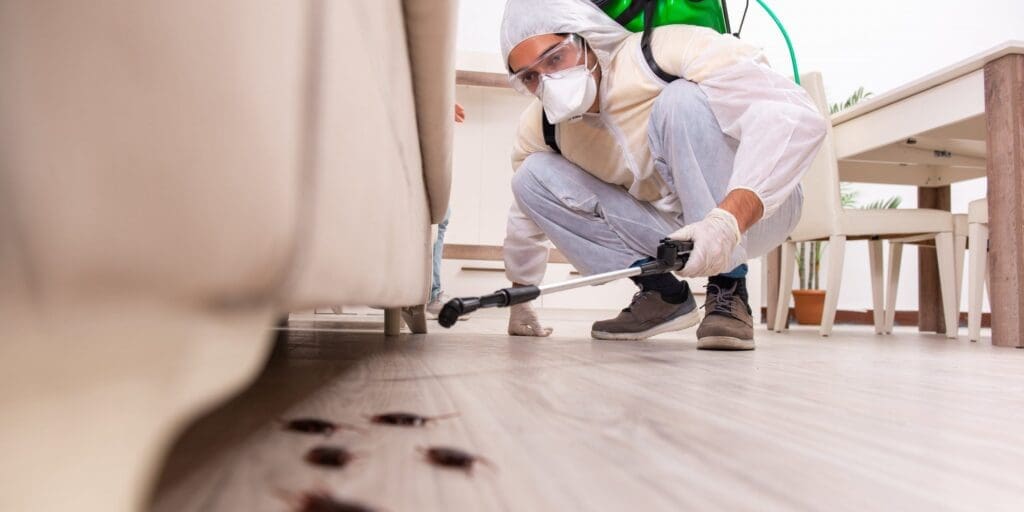
Importance of Pest Control in the Hospitality Industry
In the hospitality industry, the importance of pest control cannot be overstated. With guests frequenting hotels, restaurants, and other establishments, it is essential to create a clean and welcoming environment. Guests expect a pleasant stay or dining experience, and the presence of pests can quickly turn their perception sour. A single sighting of a cockroach or a rat can tarnish the reputation of an establishment and lead to negative reviews and loss of business. Therefore, implementing effective pest control measures is crucial to maintain a positive image and ensure customer satisfaction.
Health and Safety Regulations
The hospitality industry is governed by health and safety regulations that must be strictly adhered to. These regulations ensure that establishments maintain a safe and hygienic environment for their guests and staff. Pest infestations not only pose a risk to the health and well-being of individuals but also violate these regulations. To comply with these regulations, regular pest control inspections and treatments are necessary. Failure to do so can result in fines, penalties, and even closure of the establishment until the issue is resolved.
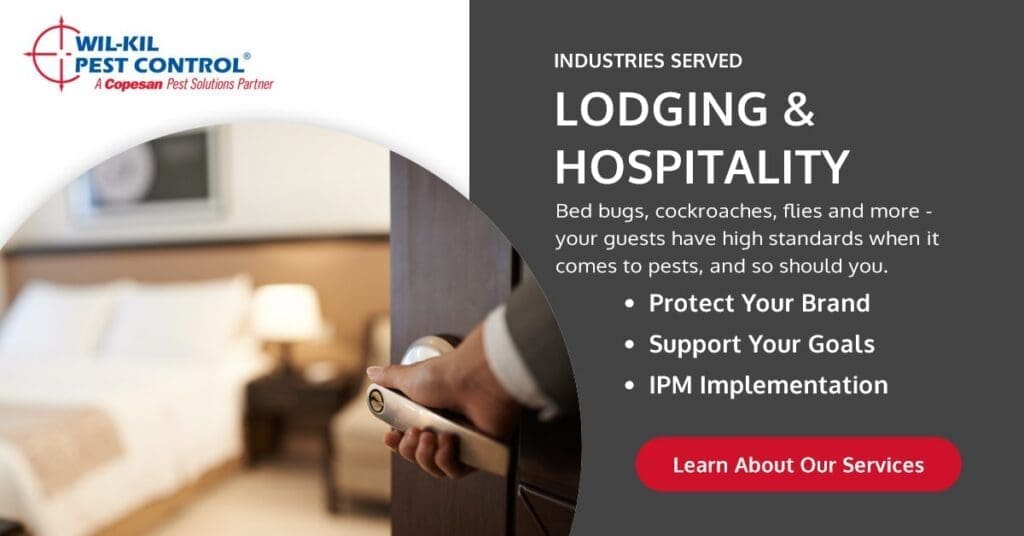
The Impact of Pests
Pests can have a detrimental impact on the hospitality industry. They can cause property damage, contaminate food and surfaces, and spread diseases. Rodents like rats and mice can chew through electrical wires, causing fires and potential hazards. Cockroaches and flies can carry bacteria and pathogens, leading to foodborne illnesses. Bed bugs, another common pest in the industry, can cause discomfort and distress to guests, leading to negative experiences and potential lawsuits. The impact of pests on both the physical environment and the well-being of individuals should not be underestimated.
Common Pests in the Hospitality Industry
In the hospitality industry, there are several pests that are commonly encountered. These pests include rodents, cockroaches, ants, bed bugs, flies, and mosquitoes, among others. Rodents are attracted to food sources and can easily find their way into kitchens and storage areas. Cockroaches thrive in warm and moist environments, making hotels and restaurants an ideal breeding ground. Bed bugs, often carried by guests, can quickly infest rooms and spread throughout the establishment. Understanding the behavior and habits of these pests is crucial in implementing effective pest control measures.
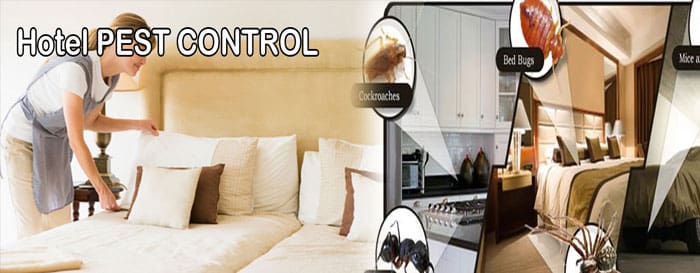
Preventive Measures
Prevention is key when it comes to pest control in the hospitality industry. By implementing preventive measures, establishments can minimize the risk of pest infestations and the associated problems. Some key preventive measures include:
-
Proper sanitation: Maintaining cleanliness and proper sanitation practices is essential to deter pests. Regular cleaning, removal of food debris, and proper waste management are crucial. Staff should be trained to clean and sanitize areas effectively, paying attention to high-risk areas such as kitchens and storage spaces.
-
Exclusion: Sealing entry points and blocking potential access for pests is critical in preventing infestations. This can include sealing cracks and gaps, installing door sweeps, and ensuring windows are properly screened.
-
Waste management: Proper waste management is essential to prevent attracting pests. Regular garbage disposal, using sealed bins, and keeping outdoor areas clean and free of trash can help minimize pest activity.
-
Maintenance: Regular maintenance of the building, including checking for leaks, repairs, and addressing any issues that may attract pests, can go a long way in preventing infestations.
Regular Inspections and Monitoring
Regular inspections and monitoring are fundamental in pest control. By conducting routine inspections, establishments can identify any signs of pest activity early on and take prompt action. This can include checking for droppings, gnaw marks, trails, or any other evidence of pests. Monitoring devices such as traps and baits can also be used strategically to detect and capture pests. By staying vigilant and proactive, establishments can quickly address pest issues before they escalate.
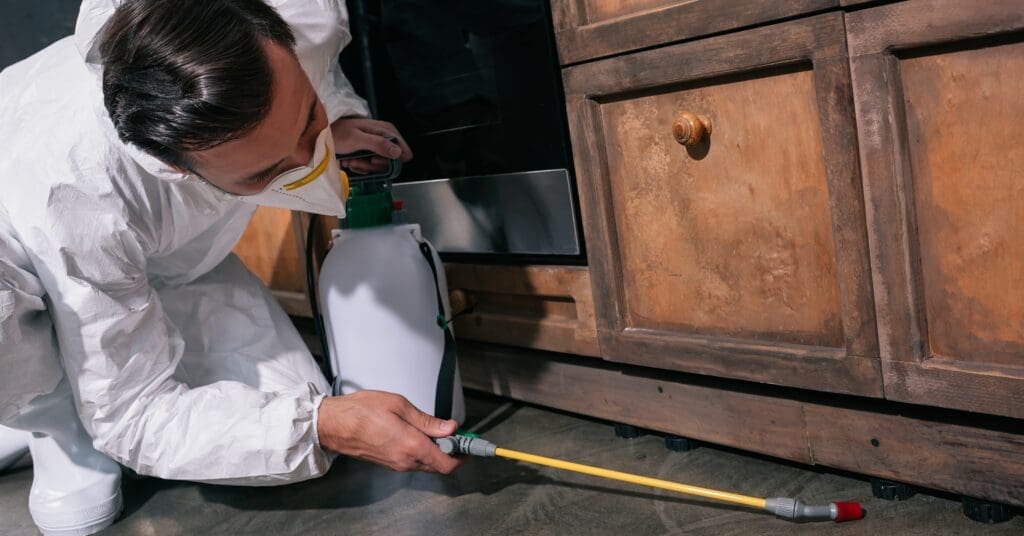
Integrated Pest Management (IPM)
Integrated Pest Management (IPM) is a holistic approach to pest control that focuses on prevention, monitoring, and targeted treatments. In the hospitality industry, implementing IPM can be highly effective in managing pest populations while minimizing the use of chemical pesticides. IPM involves the integration of various techniques, such as cultural controls, mechanical controls, biological controls, and the careful application of pesticides when necessary. By utilizing multiple strategies and techniques, establishments can achieve long-term pest control without compromising the health and safety of guests and staff.
Training and Education for Staff
Proper training and education for staff are crucial in maintaining effective pest control. Staff members should be knowledgeable about pest identification, signs of infestation, and preventive measures. Training programs should cover topics such as proper sanitation practices, waste management, and the importance of reporting any signs of pest activity. By empowering staff with the necessary knowledge and skills, establishments can create a unified approach to pest control.
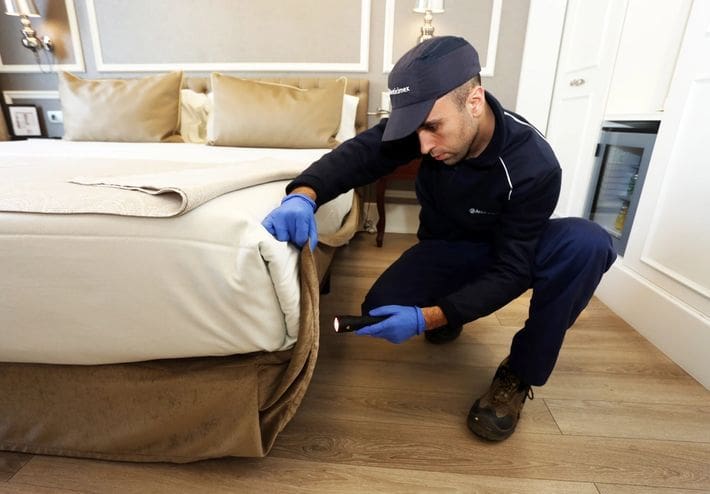
Hiring Professional Pest Control Services
While preventive measures and regular inspections are essential, seeking professional help from pest control services is highly recommended. Pest control professionals have the expertise, tools, and resources to identify and address pest issues effectively. They can conduct thorough inspections, develop customized treatment plans, and provide ongoing monitoring and maintenance. By partnering with reputable pest control companies, establishments can ensure comprehensive pest control that meets industry standards and regulations.
Tips for Hotel Rooms and Public Areas
In addition to general pest control measures, specific attention should be given to hotel rooms and public areas. These areas are particularly susceptible to pest activity and require careful management. Some tips for maintaining pest-free hotel rooms and public areas include:
- Regularly inspecting rooms for signs of bed bugs, such as blood stains, fecal spots, or live bugs.
- Laundering bedding, linens, and curtains regularly to prevent bed bug infestations.
- Implementing effective trash management in public areas to minimize the risk of attracting pests.
- Properly sealing and storing food items in guest rooms to prevent foraging pests like ants and rodents.
- Installing screens on windows and doors to prevent entry of flies, mosquitoes, and other flying insects.
Conclusion
In the hospitality industry, pest control is not just a matter of aesthetics but a necessity for the health, safety, and reputation of the establishment. By recognizing the importance of pest control, complying with regulations, implementing preventive measures, and seeking professional assistance when needed, establishments can create a clean and welcoming environment for their guests. With a proactive approach to pest control, the hospitality industry can thrive and provide memorable experiences for all.

I am Randy, the author behind PestControld.com. Drawing from decades of experience, I aim to provide valuable insights, expert advice, and practical recommendations to help you make informed decisions when assessing viable pest control solutions.